This Day in Rock History - August 27th
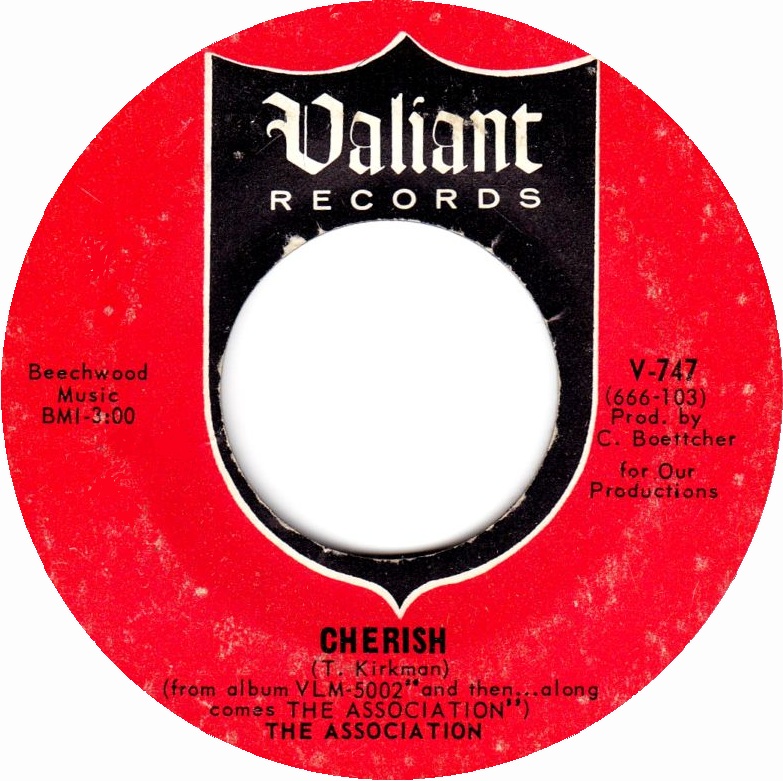 1966: Warner Brothers releases a new single by the Association. Label execs are worried that the song is too long for Top 40 airplay. So, the label intentionally prints a running time of just 3 minutes (3:00) on the label although the song runs a bit longer.
1966: Warner Brothers releases a new single by the Association. Label execs are worried that the song is too long for Top 40 airplay. So, the label intentionally prints a running time of just 3 minutes (3:00) on the label although the song runs a bit longer.
That record, “Cherish” would get lots of airplay, reaching #1 only 4 weeks later.
This Day in Rock History - August 26th
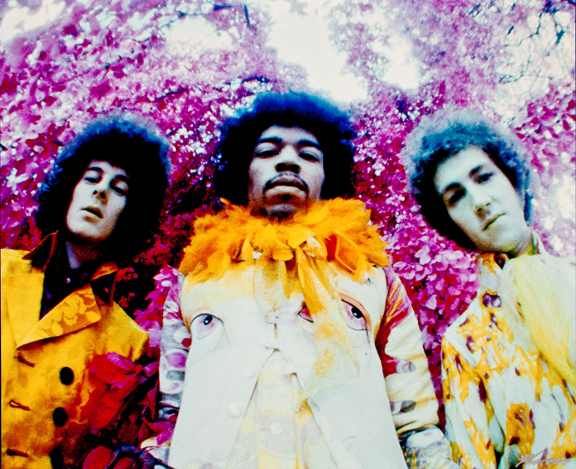
1967: Warner Brothers records releases “Purple Haze” by the Jimi Hendrix Experience to American radio stations. The song initially bombs, never cracking the Top 40. In a few months, American kids will catch on to what Jimi is doing.
This Day in Rock History - August 25th

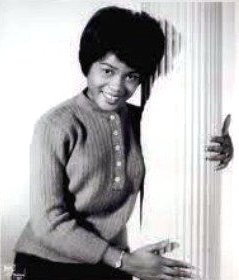 1962: Rock producer Don Kirshner hears a demo recording of a new tune written by Gerry Goffin and Carole King. He decides to produce it. He likes the singer on the demo so much, he invites her to re-record her performance for the song’s official release.
1962: Rock producer Don Kirshner hears a demo recording of a new tune written by Gerry Goffin and Carole King. He decides to produce it. He likes the singer on the demo so much, he invites her to re-record her performance for the song’s official release.
The singer was Goffen & King’s babysitter, Eva Boyd. Kirshner gives her the name Little Eva and the record “The Loco-Motion” goes on to become a huge hit.
This Day in Rock History - August 24th

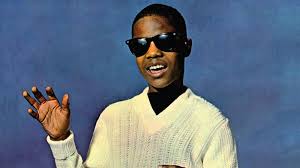
1963: For the first time in the history of Billboard magazine, one recording act sits at #1 on both the singles and the albums charts. The first act to accomplish this feat was “the 12-year old genius,” Stevie Wonder with “Fingertips Part 2” and his first LP, “Little Stevie Wonder!”
This Day in Rock History - August 23rd
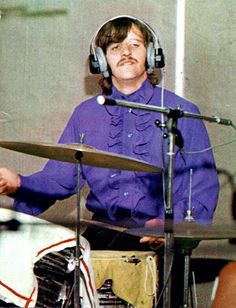 1968: In the midst of recording “The White Album,” Ringo Starr quits the Beatles, telling John Lennon that he doesn’t think he’s drumming all that well and he doesn’t feel as close to the other three as they seem to be to each other. He leaves on vacation with his wife, Maureen.
1968: In the midst of recording “The White Album,” Ringo Starr quits the Beatles, telling John Lennon that he doesn’t think he’s drumming all that well and he doesn’t feel as close to the other three as they seem to be to each other. He leaves on vacation with his wife, Maureen.
The lads convince him to return and when he arrives back at the studio, finds his drum kit surrounded by flowers.
Rock & Roll Sideshow
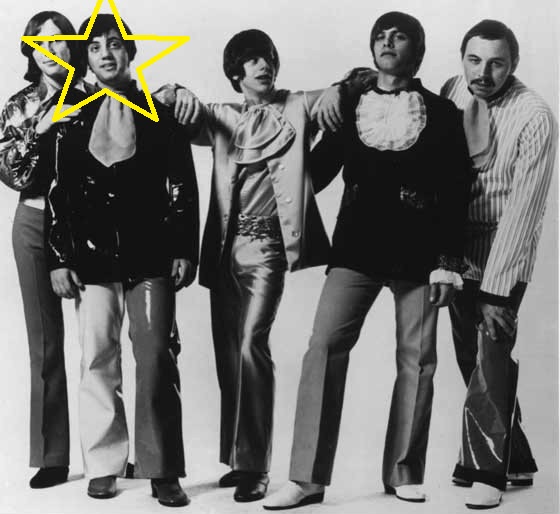
This band withh the bad fashion sense was known as The Hassles.
Four of the guys have been forgotten by time, but the keyboard player, well, you might know him.
He goes by the name of Billy Joel!
Bye Bye Birdie (1963)
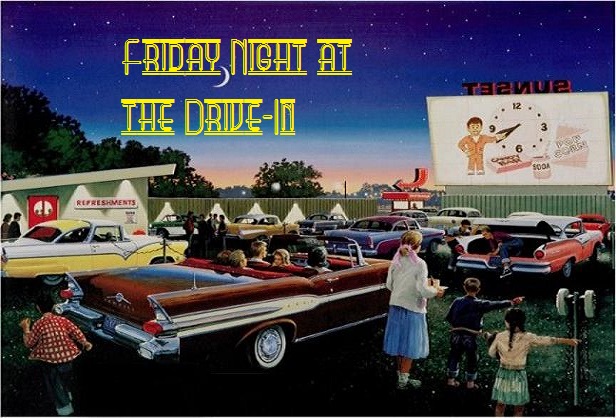 One of the great movies of our adolescent years was Bye Bye Birdie, the film version of the successful Broadway musical.
One of the great movies of our adolescent years was Bye Bye Birdie, the film version of the successful Broadway musical.
It’s one of the rare instances when the changes Hollywood inevitably brings to Broadway adaptations actually improved the story.
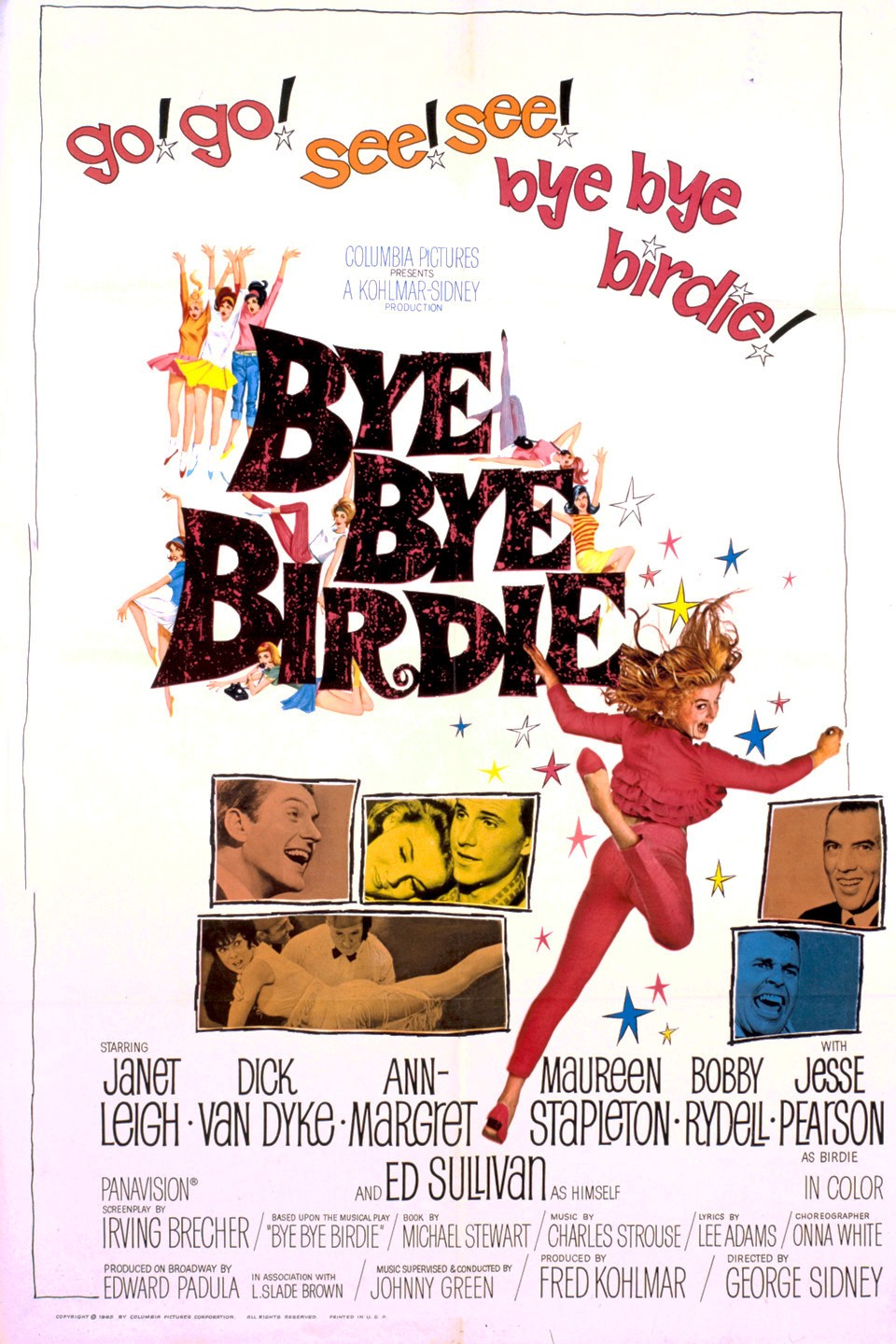 The story was inspired by Elvis Presley’s 1957 induction into the army. The title character’s name was a play on then current rock singer (and future country star) Conway Twitty.
The story was inspired by Elvis Presley’s 1957 induction into the army. The title character’s name was a play on then current rock singer (and future country star) Conway Twitty.
Dick Van Dyke and Paul Lynde were brought in from the stage show to play essentially the same parts.
There were two big changes.
The first was in the character played by Dick Van Dyke, Albert Peterson.
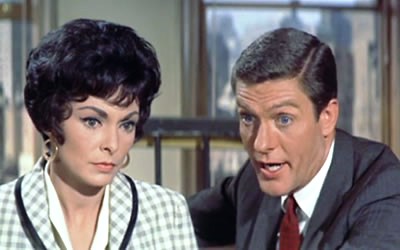 On the stage, Albert was Birdie’s manager who really wanted to be an English teacher. As anyone today knows, the manager of a rock star like Elvis would have been rolling in dough and his money-maker toddling off to serve Uncle Sam would not have slowed the gravy train all that much. But in the Broadway show, somehow Albert is broke and going to be broker once Birdie is in the army.
On the stage, Albert was Birdie’s manager who really wanted to be an English teacher. As anyone today knows, the manager of a rock star like Elvis would have been rolling in dough and his money-maker toddling off to serve Uncle Sam would not have slowed the gravy train all that much. But in the Broadway show, somehow Albert is broke and going to be broker once Birdie is in the army.
Irving Brecher, who adapted the musical for the screen, gave Albert a much more plausible situation. In the film, he is a wannabe songwriter who discovered Birdie but foolishly let his best friend become Birdie’s manager with the promise that Conrad would someday sing some of Albert’s songs.
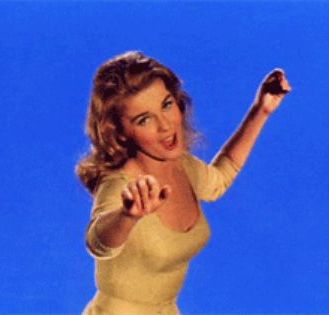 This makes Dick Van Dyke’s poverty much more believable. It also adds some urgency to the movie’s main plot point – Conrad singing Albert’s song “One Last Kiss,” his last hope for success as a songwriter.
This makes Dick Van Dyke’s poverty much more believable. It also adds some urgency to the movie’s main plot point – Conrad singing Albert’s song “One Last Kiss,” his last hope for success as a songwriter.
The second change was to focus the movie on Ann-Margaret’s character and not Janet Leigh’s. Columbia was (correctly) convinced that Ann-Margaret would become a major star and that the movie would find a wider audience with teenagers than adults. In fact, this change inspired Paul Lynde to quip that the movie ought to be re-titled “Hello, Ann-Margaret!”
Some things to watch:
- T
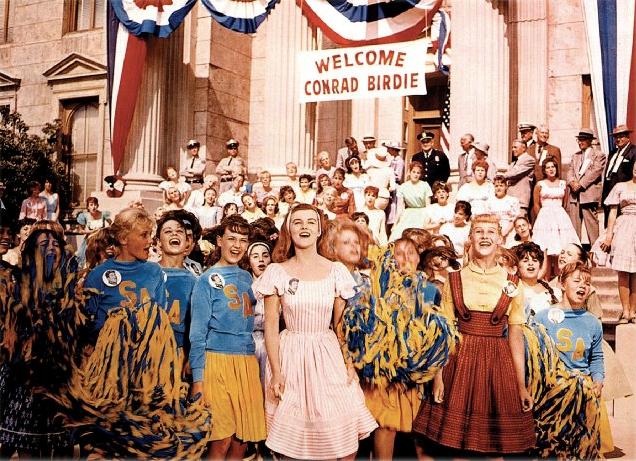 he town square and courthouse where Conrad Birdie lays the town of Sweet Apple to waste with his rendition of “Honestly Sincere” is the same one that figures so prominently in Back to the Future. The only thing different is the big clock on the courthouse added for the Michael J. Fox film.
he town square and courthouse where Conrad Birdie lays the town of Sweet Apple to waste with his rendition of “Honestly Sincere” is the same one that figures so prominently in Back to the Future. The only thing different is the big clock on the courthouse added for the Michael J. Fox film. - The multi-image screen images used for “The Telephone Hour” musical number were quite innovative for the time.
- While Bobby Rydell never acted in any more movies, he did wind up getting a high school named after him in Grease.
- In addition, Oona White’s choreography is this film heavily influenced the staging of musical numbers in 1978’s film version of Grease.
- The film did not fare as well in the UK. By the time it opened, British teens thought the film was making fun of their obsession with the Beatles. (Elvis who?)
- Regardless of what the Brits thought, the film’s “We Love You Conrad” song was re-tooled for Beatlemania by the Carefrees in 1964.
- Ann-Margaret’s torrid opening number, “Bye Bye Birdie” was written especially for the film
- That opening number also became a major plot point in the television series Mad Men.
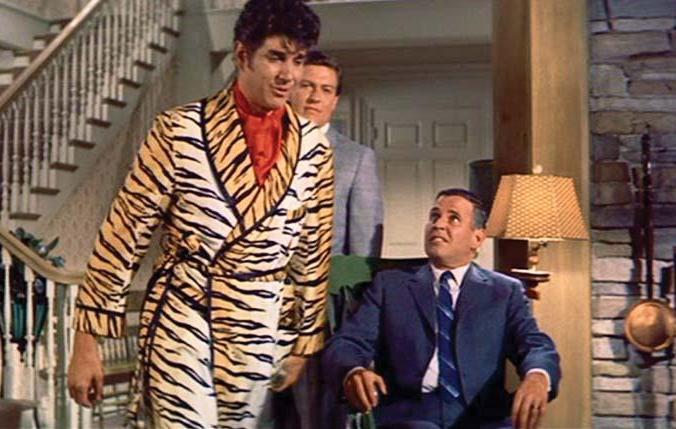 While Van Dyke, Leigh and Lynde were understandably upset with the way Hollywood changed Bye Bye Birdie, the studio knew best. The film was a huge hit and has gone on to become one of the best remembered, best loved, and most influential films from that era.
While Van Dyke, Leigh and Lynde were understandably upset with the way Hollywood changed Bye Bye Birdie, the studio knew best. The film was a huge hit and has gone on to become one of the best remembered, best loved, and most influential films from that era.
Nutrition on the Cheap
 Eating healthy doesn’t have to mean spending more money for “organic’ or “natural” foods.
Eating healthy doesn’t have to mean spending more money for “organic’ or “natural” foods.
Foods that are natural and downright inexpensive include:
- Bananas
- Peanut Butter
- Green and Black Teas
- Cabbage
- Beans
- Lentils
- Carrots
- Oatmeal
- Salmon
- Sweet Potatoes
The TV That Time Forgot: The Millionaire
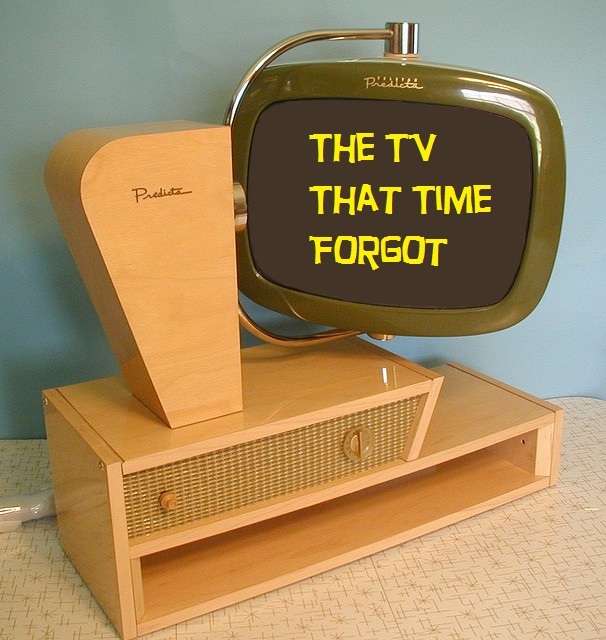 Boy! Could we use a show like this in real life!
Boy! Could we use a show like this in real life!
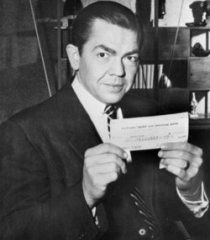 From 1955 to 1960, for 5 seasons an eccentric millionaire would give away $1 million to somebody he never even met. We were allowed to eavesdrop on the consequences of this sudden cash windfall on CBS.
From 1955 to 1960, for 5 seasons an eccentric millionaire would give away $1 million to somebody he never even met. We were allowed to eavesdrop on the consequences of this sudden cash windfall on CBS.
The man who gave the million was identified at John Beresford Tipton. We never saw any more of him than the back of his head or his arm as he handed a cashier’s check to his executive secretary.
The man who delivered the million was Michael Anthony, played by veteran actor and announcer Marvin Miller. Each week, Miller would look directly into the camera and say something like this:
“My name is Michael Anthony, and until his death a few years ago, I was executive secretary to the late John Beresford Tipton, Jr., a fabulously wealthy and fascinating man, whose many hobbies included his habit of giving away one million dollars, tax free, each week — to persons he had never even met.”
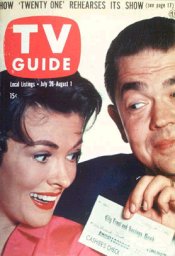 In today’s money, that certified cashier’s check would be worth around $11 million.
In today’s money, that certified cashier’s check would be worth around $11 million.
Some weeks, the money ended in tragedy. Some weeks in triumph. But America was hooked. The show finished in the Top 20 every season of its first run, except the final season.
Among those who appeared on the show: Richard Anderson, Charles Bronson, John Carradine, Chuck Connors, Angie Dickinson, Barbara Eden, Peter Graves, Harry Guardino, Dennis Hopper, David Janssen, Jack Lord, Lee Meriwether, Martin Milner, Mary Tyler Moore, Agnes Moorehead, Rita Moreno, Aaron Spelling, Robert Vaughn, and Betty White.
Only once did, multi-millionaire Tipton take a direct role in an episode. That one concerned a man who was on death row, wrongly convicted of murder. Tipton visited the man in prison, but we still never saw his face. For the record, Tipton was played by a man more famous as the voice of Boris Badenov, Paul Frees.
For all of its success as a first run series and a long run in syndication, The Millionaire has never had an official home video release.
Pop Up Player
Latest Posts–Movies & TV
-
The TV That Time Forgot: Annie Oakley
There was a time when Westerns dominated television programming so thoroughly that it was tough (with no home video, no streaming, and just 3 networks if you lived in a city big enough to have…
-
The TV That Time Forgot: My Living Doll (1964-65)
For a show that lasted only a single season, a surprising number of Baby Boomers remember the situation comedy My Living Doll. Perhaps that’s because once seen, Julie Newmar cannot easily be forgotten. The situation…
-
Alfred Hitchcock Presents
While often lumped together with “The Twilight Zone” and “Boris Karloff’s Thriller,” “Alfred Hitchcock Presents” is the true original, debuting 4 years before TZ and 5 before “Thriller.” Alfred Hitchcock’s show was also different than…
-
The TV That Time Forgot: The Donna Reed Show
For 8 seasons, The Donna Reed Show provided Baby Boomers with a sort of Mother Knows Best amid a ton of family sitcoms focused on the father. Cast as Donna Stone, Donna presided over a…
-
Friday Night at the Drive-In: Lover Come Back (1961)
Sequels & remakes? Nothing new here – Hollywood’s been recycling stuff ever since the first “magic lantern shows.” Want proof? Let’s settle in to watch one of those terribly puritanical “sex comedies” from the Sixties…
-
The TV That Time Forgot: The Millionaire
Boy! Could we use a show like this in real life! From 1955 to 1960, for 5 seasons an eccentric millionaire would give away $1 million to somebody he never even met. We were allowed…



